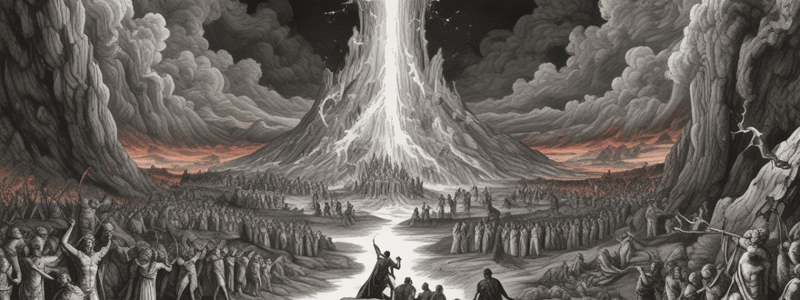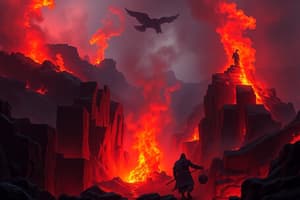Podcast
Questions and Answers
What is the speaker's reflection on the war in the poem?
What is the speaker's reflection on the war in the poem?
- A sense of pride and victory
- A sense of justification and righteousness
- A sense of indifference and apathy
- A sense of hopelessness and pity (correct)
What is the significance of the 'titanic wars' mentioned in the poem?
What is the significance of the 'titanic wars' mentioned in the poem?
- They are a reference to the natural world's grandeur
- They are a reminder of the destruction caused by war (correct)
- They are a symbol of the speaker's own strength and power
- They are a metaphor for the speaker's inner struggle
What is the speaker's attitude towards the 'wildest beauty' they pursued?
What is the speaker's attitude towards the 'wildest beauty' they pursued?
- They are nostalgic and romantic about it
- They are regretful and disappointed about it (correct)
- They are proud and triumphant about it
- They are detached and indifferent about it
What is the significance of the 'swift running of the hour' in the poem?
What is the significance of the 'swift running of the hour' in the poem?
What is the tone of the speaker's statement 'Let us sleep now...'?
What is the tone of the speaker's statement 'Let us sleep now...'?
What is the significance of the speaker's statement 'I am the enemy you killed, my friend'?
What is the significance of the speaker's statement 'I am the enemy you killed, my friend'?
What is the theme of the poem's final stanza?
What is the theme of the poem's final stanza?
What is the symbolism of the 'cess of war' in the poem?
What is the symbolism of the 'cess of war' in the poem?
What is the tone of the speaker's statement 'Courage was mine, and I had mystery'?
What is the tone of the speaker's statement 'Courage was mine, and I had mystery'?
What is the significance of the 'foreheads of men' mentioned in the poem?
What is the significance of the 'foreheads of men' mentioned in the poem?
What is the speaker's primary concern in the poem?
What is the speaker's primary concern in the poem?
What is the tone of the speaker's statement about the 'undone years'?
What is the tone of the speaker's statement about the 'undone years'?
What is the significance of the 'granites' in the poem?
What is the significance of the 'granites' in the poem?
What is the speaker's attitude towards their own role in the war?
What is the speaker's attitude towards their own role in the war?
What is the significance of the 'cess of war' in the poem?
What is the significance of the 'cess of war' in the poem?
What is the speaker's perspective on the relationship between courage and wisdom?
What is the speaker's perspective on the relationship between courage and wisdom?
What is the significance of the 'wildest beauty' in the poem?
What is the significance of the 'wildest beauty' in the poem?
What is the tone of the speaker's statement about the 'hopelessness' of war?
What is the tone of the speaker's statement about the 'hopelessness' of war?
What is the significance of the 'titanic wars' in the poem?
What is the significance of the 'titanic wars' in the poem?
What is the speaker's perspective on the relationship between individual action and societal progress?
What is the speaker's perspective on the relationship between individual action and societal progress?
What is implied by the 'profound dull tunnel' in the poem's opening lines?
What is implied by the 'profound dull tunnel' in the poem's opening lines?
What is the significance of the 'sleepers' in the poem?
What is the significance of the 'sleepers' in the poem?
What does the 'wildest beauty' pursued by the speaker represent?
What does the 'wildest beauty' pursued by the speaker represent?
What is the speaker's tone towards the 'undone years'?
What is the speaker's tone towards the 'undone years'?
What is the significance of the 'chariot-wheels' mentioned in the poem?
What is the significance of the 'chariot-wheels' mentioned in the poem?
What is the meaning of 'foreheads of men have bled where no wounds were'?
What is the meaning of 'foreheads of men have bled where no wounds were'?
What is the speaker's attitude towards their own role in the war?
What is the speaker's attitude towards their own role in the war?
What is the significance of the 'cess of war' in the poem?
What is the significance of the 'cess of war' in the poem?
What is the speaker's perspective on the relationship between individual action and societal progress?
What is the speaker's perspective on the relationship between individual action and societal progress?
What is the significance of the speaker's statement 'I am the enemy you killed, my friend'?
What is the significance of the speaker's statement 'I am the enemy you killed, my friend'?
Flashcards are hidden until you start studying
Study Notes
The Poem's Speaker and Setting
- The speaker describes escaping from battle through a profound dull tunnel, suggesting a traumatic experience.
- The setting is Hell, as revealed by the speaker's recognition of a "sullen hall" and a dead smile.
The Encounter with a Fallen Soldier
- The speaker encounters a soldier who has been disturbed from sleep or death.
- The soldier stares with piteous recognition, and the speaker recognizes the "piteous eyes".
- The soldier's smile is "dead", implying a sense of despair and hopelessness.
Reflections on War and Humanity
- The speaker attempts to comfort the soldier, saying there is no cause to mourn, but the soldier responds with a sense of hopelessness and regret.
- The soldier laments the "undone years" and the "pity of war", suggesting a deep sense of loss and sorrow.
- The speaker and the soldier both share a sense of disillusionment with the war and its effects on humanity.
The Soldier's Story
- The soldier recounts their life, saying they lived for the "wildest beauty in the world" and that their life was marked by a sense of emptiness and loss.
- The soldier expresses regret for not being able to share their pain and sorrow with others, saying "of my weeping something had been left, / Which must die now".
The Pity of War
- The soldier reflects on the futility of war, saying that men will continue to fight and be bloodied, but ultimately, "none will break ranks".
- The soldier notes that courage and wisdom are lost in the chaos of war, and that the world is retreating into darkness.
- The poem concludes with the soldier identifying themselves as the "enemy you killed, my friend", emphasizing the tragic and senseless nature of war.
The Poem's Speaker and Setting
- The speaker describes escaping from battle through a profound dull tunnel, suggesting a traumatic experience.
- The setting is Hell, as revealed by the speaker's recognition of a "sullen hall" and a dead smile.
The Encounter with a Fallen Soldier
- The speaker encounters a soldier who has been disturbed from sleep or death.
- The soldier stares with piteous recognition, and the speaker recognizes the "piteous eyes".
- The soldier's smile is "dead", implying a sense of despair and hopelessness.
Reflections on War and Humanity
- The speaker attempts to comfort the soldier, saying there is no cause to mourn, but the soldier responds with a sense of hopelessness and regret.
- The soldier laments the "undone years" and the "pity of war", suggesting a deep sense of loss and sorrow.
- The speaker and the soldier both share a sense of disillusionment with the war and its effects on humanity.
The Soldier's Story
- The soldier recounts their life, saying they lived for the "wildest beauty in the world" and that their life was marked by a sense of emptiness and loss.
- The soldier expresses regret for not being able to share their pain and sorrow with others, saying "of my weeping something had been left, / Which must die now".
The Pity of War
- The soldier reflects on the futility of war, saying that men will continue to fight and be bloodied, but ultimately, "none will break ranks".
- The soldier notes that courage and wisdom are lost in the chaos of war, and that the world is retreating into darkness.
- The poem concludes with the soldier identifying themselves as the "enemy you killed, my friend", emphasizing the tragic and senseless nature of war.
The Poem's Speaker and Setting
- The speaker describes escaping from battle through a profound dull tunnel, suggesting a traumatic experience.
- The setting is Hell, as revealed by the speaker's recognition of a "sullen hall" and a dead smile.
The Encounter with a Fallen Soldier
- The speaker encounters a soldier who has been disturbed from sleep or death.
- The soldier stares with piteous recognition, and the speaker recognizes the "piteous eyes".
- The soldier's smile is "dead", implying a sense of despair and hopelessness.
Reflections on War and Humanity
- The speaker attempts to comfort the soldier, saying there is no cause to mourn, but the soldier responds with a sense of hopelessness and regret.
- The soldier laments the "undone years" and the "pity of war", suggesting a deep sense of loss and sorrow.
- The speaker and the soldier both share a sense of disillusionment with the war and its effects on humanity.
The Soldier's Story
- The soldier recounts their life, saying they lived for the "wildest beauty in the world" and that their life was marked by a sense of emptiness and loss.
- The soldier expresses regret for not being able to share their pain and sorrow with others, saying "of my weeping something had been left, / Which must die now".
The Pity of War
- The soldier reflects on the futility of war, saying that men will continue to fight and be bloodied, but ultimately, "none will break ranks".
- The soldier notes that courage and wisdom are lost in the chaos of war, and that the world is retreating into darkness.
- The poem concludes with the soldier identifying themselves as the "enemy you killed, my friend", emphasizing the tragic and senseless nature of war.
Studying That Suits You
Use AI to generate personalized quizzes and flashcards to suit your learning preferences.




